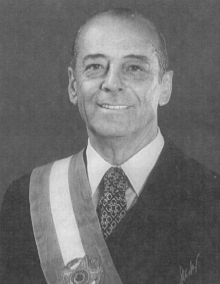- João Baptista de Oliveira Figueiredo
Infobox_President
name=João Baptista de Oliveira Figueiredo
nationality=Brazilian

term_start=March 15 ,1979
term_end=March 15 ,1985
predecessor=Ernesto Geisel
successor=Tancredo Neves
birth_date=birth date|1918|1|15|mf=y
birth_place=Rio de Janeiro ,Rio de Janeiro
death_date=death date and age|1999|12|24|1918|1|15|mf=y
death_place=Rio de Janeiro ,Rio de Janeiro
spouse=
party=National Renewal Alliance Party - ARENA
order=33rdPresident of Brazil
vicepresident=Aureliano Chaves João Baptista de Oliveira Figueiredo, pron. IPA2|ʒu'ɐ̃w ba'tistɐ di oli'vejɾɐ figej'redu, (
January 15 ,1918 –December 24 ,1999 ) was aBrazil ian military leader and politician. He was chief of the Secret Service (SNI) during the term of his predecessorErnesto Geisel . Figueiredo was chosen to be president ofBrazil by the former military leader, General Ernesto Geisel. He took the oath of office onMarch 15 ,1979 , serving untilMarch 15 1985 . He continued the democratization that Geisel started and decreed amnesty. Facing a severe economic crisis, Figueiredo became increasingly unpopular. He suffered a heart attack in 1981. Since 1964, Brazilians had not been allowed to vote for president and by 1983 they began to demonstrate for the return of the democracy. Figueiredo was against this desire and in 1984 the Congress rejected the return of direct elections. But the opposition, headed byTancredo Neves , won the election for president in the Congress. Figueiredo retired after the end of his term and died in 1999.Biography
João Baptista de Oliveira Figueiredo was the son of General Euclides de Oliveira Figueiredo, who was exiled after an attempt to topple a dictatorship in 1932. After studying at military schools of
Porto Alegre and Realengo, Figueiredo was promoted to captain (1944) and to major (1952). He served in the Brazilian military mission inParaguay (1955–1957) and worked for secret service of the Army General Staff (1959–1960). In 1961 he was transferred to the National Security Council. While teaching at the Army General Staff Command College (1961–1964), Figueiredo was promoted to colonel and appointed the department head in the National Information Service. In 1966 he assumed the command of public defense force inSão Paulo . In 1967–1969 he commanded a regiment inRio de Janeiro and was promoted to general. When GeneralEmílio Garrastazú Médici assumed the presidency, Figueiredo was appointed head of the president's military staff (October 30 1969 -March 15 1974 ).In 1974 he assumed the leadership of the National Information Service (
March 15 1974 -June 14 1978 ), a Brazil's internal security agency. Picked by PresidentErnesto Geisel as potential successor, Figueiredo defeated opposition candidate, General Monteiro, and continued the gradual "abertura" (democratization) process instituted in 1974. An amnesty law, signed by Figueiredo on28 August 1979 , amnestied those convicted of "political or related" crimes between 1961 and 1978. In the early 1980s, the military regime could not effectively maintain the two-party system established in 1966. The Figueiredo administration dissolved the government-controlled National Renewal Alliance Party (ARENA) and allowed new parties to be formed. In 1981 the Congress enacted a law on restoration of direct elections of state governors. The general election of 1982 brought victory to Arena's successor, pro-government PDS {Democratic Social Party} (43.22% of the vote), and to the opposition PMDB {Brazilian Democratic Movement Party} (42.96%).The governorship of three major states, São Paulo, Rio de Janeiro and
Minas Gerais , was won by the opposition. However, the political developments were overshadowed by economic problems. As inflation and unemployment soared, the foreign debt reached massive proportions making Brazil the world's biggest debtor owing about US$90 billion to international lenders. The austerity program imposed by the government brought no signs of recovery for the Brazilian economy until the end of Figueiredo's term. The president was often incapacitated by illness and took two prolonged leaves for health treatment in 1981 and 1983, but the civilian vice president AntônioAureliano Chaves de Mendonça did not enjoy major political power. The opposition vigorously struggled for passing a constitutional amendment to allow direct popular elections in November 1984, but the proposal failed to win passage in the Congress.Trivia
Figueiredo was reputed a severe and unpolite military man and often spoke in harsh terms. He was famously quoted saying:
* "I will arrest and torture but I will make of this country a democracy"
* "I prefer the smell of my horses than that of the people"
* "The people are a beast of burden you pull by the reins"
* About elections: "A people who doesn't know how to brush their teeth cannot vote"
* Asked by a child what he would do if he had to live on aminimum wage : "I would put a bullet through my skull"
* On leaving office: "Tell the people to forget me"ee also
*
List of Presidents of Brazil
*History of Brazil (1964-present)
Wikimedia Foundation. 2010.
